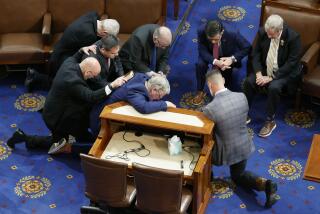Christian Coalition
- Share via
Rabbi Eli Hecht is absolutely right to be concerned about the Christian Coalition’s increasing and insidious influence on the Republican Party (Commentary, May 19). But he misreads American history when he says that it was the Founders’ intent that “government was to be religious.” Any claim that the authors of the Constitution ever intended our government to be religious is completely unsupportable. Religion is only mentioned once in the original document, and then only to exclude it absolutely: Article VI says plainly that “no religious test shall ever be required as a qualification to any office or public trust.” That’s it: There is no reference anywhere to any sort of supreme being.
And when the Bill of Rights was passed, the First Amendment only added more bricks to the wall of separation between church and state: “Congress shall make no law respecting an establishment of religion.” The rabbi errs when he states that “it’s freedom of religion, not freedom from religion, that concerns us.” Without freedom from religion, freedom of religion is an empty shell.
The most persistent fallacy the Christian Coalition puts forth is that this country was founded as a Christian nation. If that were true, the Founders surely would have made at least some reference to Christ in the document that provides its foundation. That they did not is solid evidence that they understood how important it is that church and government must never interfere with each other.
TOM HART
Costa Mesa
To foster anxiety and fear toward the religious right, Hecht used the oldest trick in the book: He fibbed. He seriously mischaracterized their aims.
He compared them to a “monster.” He warned us of a “man-eating government taking away our religious freedom.” He reminded us that “having government dictate a national religion was not part of the [Founding Fathers’] plan.” He quoted Washington’s words about a government that “gives bigotry no sanction” and suggested that the Republican Party and the Christian Coalition “may be discounting the message of our first President.”
Conveniently, he never mentioned anything specific about the open agenda of the Christian Coalition. Had he done so, he couldn’t have leveled such scary generalities against them.
The “contract with the American family” upholds the tenets of religious freedom at every point. Why can’t Christians participate in the democratic process without being so maligned?
JOEL SOLLIDAY
Malibu
Norman Lear and David Ramage (Commentary, May 12) launched a failed attempt to demean and discredit religious broadcaster Pat Robertson through distortions and the use of statements out of context. Robertson is an outspoken critic of anti-Semitism and longtime defender of Israel and the Jewish people. The record is clear:
On the pages of the New York Times and the Wall Street Journal, Robertson has strongly condemned anti-Semitism and expressed regret to those who were offended by language in his 1991 book, “The New World Order.” In an April 12 column in the Wall Street Journal, Robertson wrote: “It saddens me to think that my words could ever be seen as anything but pro-Jewish. That was never the message, never my heart.” Over the years, Robertson has lobbied for Israel and donated hundreds of thousands of dollars to Jewish interests and organizations--including Operation Exodus, a resettlement effort of Russian Jews.
Lear and Ramage are equally wrong about Robertson’s view on the separation of church and state. In 1991, on “Larry King Live,” Robertson said: “I think it [the separation of church and state] is far better. You look at Europe where they have established churches and they are really dying out. We have a much healthier church here in America, free from government money . . . But I don’t think the Constitution requires government to be opposed to religious faith.”
And, in a law review article just published in the William and Mary Bill of Rights Journal, he writes: “I agree that the church and state should be separate because the separation of church and state is good for religion, religious institutions, and the religious liberty of believers.
Finally, Robertson respects all religions. However, because Robertson is an evangelical broadcaster who believes that salvation is found through the acceptance of Jesus Christ as savior--and articulates that view--Lear and Savage cry intolerance. While Robertson strongly embraces the principles of Christianity, he does not force his beliefs on anyone. With 96% of Americans stating a belief in God, there is plenty of room under the big tent of religion for people of all faith.
GENE KAPP
Vice President, Public Relations
Christian Broadcasting Network
Virginia Beach, Va.
More to Read
Get the L.A. Times Politics newsletter
Deeply reported insights into legislation, politics and policy from Sacramento, Washington and beyond. In your inbox twice per week.
You may occasionally receive promotional content from the Los Angeles Times.










